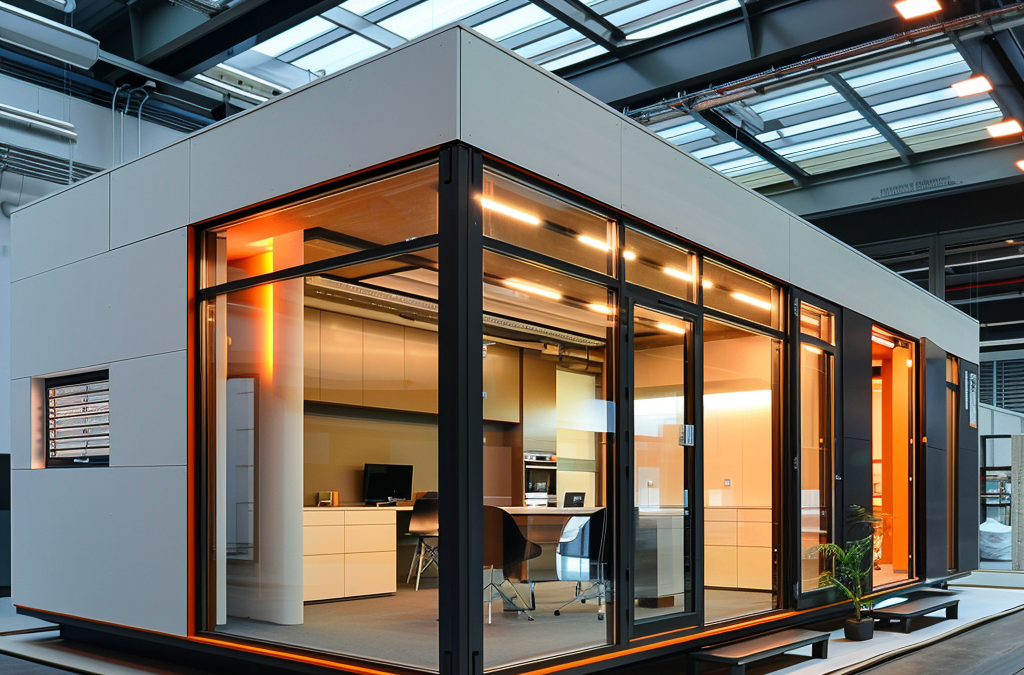Efficiency and adaptability are paramount in the dynamic landscape of modern business. Warehouses, being critical hubs of operation, need to be designed for optimal functionality. One innovative solution that significantly enhances warehouse operations is the implementation of modular warehouse offices. These structures offer a versatile approach to managing space and resources within a warehouse setting. In this article, you will learn about The Benefits of Modular Warehouse Offices.
Understanding Modular Warehouse Offices
What Are Modular Warehouse Offices?
Modular warehouse offices, sometimes referred to as warehouse mezzanines or modular office systems, are prefabricated units that can be installed within existing warehouse spaces. These units are typically made from durable materials like steel, ensuring they withstand the rigors of industrial environments. Customizable in layout, size, and features, modular offices meet specific operational needs, making them an integral part of modern warehouse design.
The Benefits of Modular Warehouse Offices
Maximizing Space Efficiency
The primary advantage of modular offices is their ability to optimize space use. By capitalizing on vertical space within the warehouse, these offices create additional work or storage areas without the need for extensive renovations or building expansions. This strategic use of space not only enhances operational capacity but also boosts overall productivity.

Enhancing Flexibility and Adaptability
Modular systems are designed for flexibility; they can be quickly assembled, disassembled, and reconfigured to meet changing business needs. This adaptability is invaluable for businesses experiencing growth, seasonal fluctuations, or evolving market demands. Moreover, the portability of these offices means they can be relocated within a warehouse or to another site as required, providing unmatched flexibility in warehouse management.
Cost-Effectiveness
Choosing modular warehouse offices is economically advantageous compared to traditional construction. The prefabricated nature of these units reduces manufacturing and assembly costs, shortens project timelines, and minimizes labor expenses. Since modular offices require minimal site preparation, installation is swift and less disruptive, further reducing costs.
Boosting Productivity and Workflow
Strategically positioned modular offices can significantly streamline workflow and enhance operational efficiency. They facilitate better communication and collaboration by positioning key staff closer to core activities. Moreover, these offices provide a controlled environment that minimizes noise and distractions, thereby increasing focus and productivity among employees.
Supporting Sustainable Practices
Modular offices support sustainability by minimizing construction waste and reducing the need for raw materials compared to traditional building methods. Their reusability and adaptability also contribute to a reduction in resource consumption over time, aligning with eco-friendly business practices.
Implementing Modular Offices in Your Warehouse
Planning and Assessment
Before implementing modular offices, it’s crucial to evaluate your specific operational requirements and available space. This assessment will guide the customization of the office to serve its intended purpose effectively.

Integration with Existing Systems
It’s important to consider how modular offices will integrate with current warehouse operations and systems. Proper integration ensures that the new offices enhance rather than disrupt workflow.
Considering Long-Term Needs
When planning for modular offices, consider future changes in operations or expansion needs. Opt for designs that offer easy reconfiguration or expansion possibilities to accommodate future growth or operational shifts.
Frequently Asked Questions About Modular Warehouse Offices
What are modular warehouse offices?
Modular warehouse offices are prefabricated structures designed to be easily installed within existing warehouse spaces. They are used to create additional office spaces, meeting rooms, or specialized work areas without the need for traditional construction, utilizing the vertical and horizontal space efficiently.
How do modular warehouse offices maximize space efficiency?
By utilizing both vertical and unused space within warehouses, modular offices create additional work areas without extending the footprint of the building. This setup allows for more efficient use of space and can help businesses avoid the costs associated with building expansions.
What makes modular offices flexible and adaptable?
Modular offices are designed to be easily assembled, disassembled, and reconfigured. This flexibility allows businesses to adjust layouts as their needs change, such as during expansions, reorganizations, or in response to new operational strategies.
Are modular warehouse offices cost-effective?
Yes, modular offices are generally more cost-effective than traditional construction because they are quicker to install, require less labor, and cause minimal disruption to warehouse operations. The prefabricated nature of the modules also means there are fewer on-site construction costs.
How do modular offices enhance productivity and workflow?
By situating office spaces closer to operational areas, modular offices enhance communication and coordination between management and operational staff. This proximity can lead to quicker decision-making, more effective supervision, and reduced movement within the warehouse, all of which boost productivity.
Can modular offices be customized?
Absolutely. Modular offices can be tailored to meet specific functional requirements, aesthetic choices, and dimensions. Common customizations include soundproofing, air conditioning, specific floor layouts, and the inclusion of particular amenities like kitchens or restrooms.
How sustainable are modular warehouse offices?
Modular offices support sustainability by reducing waste associated with traditional construction methods. Materials can be recycled and reused, and the offices can be relocated or reconfigured without the need for demolition and new construction.
What should be considered when integrating modular offices into existing operations?
When integrating modular offices, it’s important to consider the current workflow, communication lines, and future growth prospects. Ensuring that the new setup does not disrupt existing operations but rather complements them is crucial.
How often can modular offices be reconfigured?
There is no set limit to how often modular offices can be reconfigured. Their design allows for relatively easy reassembly, so businesses can reconfigure the layout as often as needed to adapt to new challenges or operational changes.
Are there limitations to where modular offices can be installed?
While modular offices are incredibly versatile, their installation may be limited by the structural capabilities of the warehouse, such as ceiling height and load-bearing capacities. It’s important to consult with structural engineers or specialists before installation to ensure the building can support the added structures.

Conclusion
Modular warehouse offices represent a smart investment for businesses looking to enhance efficiency, flexibility, and productivity within their operations. These adaptable structures not only improve space utilization and operational flow but also offer cost savings and environmental benefits. By integrating modular offices, companies can better meet the challenges of today’s fast-paced market environments, achieving greater efficiency and success in their warehouse operations.


